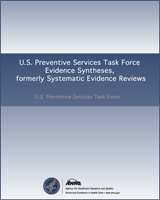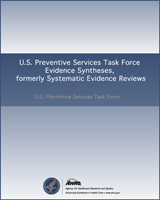NCBI Bookshelf. A service of the National Library of Medicine, National Institutes of Health.
Pignone M, Gaynes BN, Rushton JL, et al. Screening for Depression [Internet]. Rockville (MD): Agency for Healthcare Research and Quality (US); 2002 Apr. (Systematic Evidence Reviews, No. 6.)
This publication is provided for historical reference only and the information may be out of date.
Glossary of Evidence Table Abbreviations Screening for Depression
AGECAT: Computerized diagnostic screening test
AMI: Amitriptyline
ARR: Absolute risk reduction
BDI: Beck Depression Inventory
CAGE: CAGE questionnaire
CAMDEX: Cambridge Examination for Mental Disorders of the Elderly
CBT: Cognitive behavior therapy
CES-D: Centers for Epidemiologic Studies Depression scale
CGI: Clinical Global Impressions
Cntrl: Control
COG: Cognitive therapy
CT: Cognitive treatment
DI: Diagnostic interview
DIS: Diagnostic interview schedule
DK: Don't know
DSM-IIIR: Diagnostic and Statistical Manual, 3rd Edition (Revised)
DUSOI: Duke University Severity of Illness Scale
dx: Diagnosis
EPDS: Edinburgh Postnatal Depression Scale
FP: Family practice
GAS: Global Assessment Score
GDS: Geriatric Depression Scale
GDS-S: Short form Geriatric Depression Scale
GHQ: General Health Questionnaire
GMSS: Geriatric Mental Status Schedule
GP: General Practice Patients
HAM-D: Hamilton Depression Rating Scale
HS: High school
HSCL-20: Hopkins Symptomatic Checklist-20
HV: Health Visitor Counseling
ICD 10: International Classification of Disease - 10th Revision
IDS: Inventory of Depressive Symptomatology
IPT: Interpersonal psychotherapy
ITT: Intention-to-treat
MADS: Montgomery-Asberg Depression Scale
MD: Medical Doctor (when under gold standard used)
MD-UC: Depression program for major depression
MD_UC: Usual care for major depression
mD-CT: Depression program for minor depression
mD-UC: Usual care for minor depression
MMSE: Mini-Mental State Exam
MOS: Medical Outcomes Study
NA: Not available
NNT: Numbers needed to treat
NOR: Nortriptyline
NOS: Not otherwise specified
NR: Not reported
NS: Not significant
OSI: Other Structured Interview
OTH: Other
PC: Private clinic
PD: Physician diagnosis
PHQ: Patient health questionnaire
Pl: Placebo
PROQSY: Self-administered computerized assessment
PS: Problem solving
PSE: Present State Exam
PS-GP: Problem solving by general practitioner
PS-N: Problem solving by nurse
QDIS: Quick Diagnostic Interview Schedule
RDC: Research Diagnostic Criteria
RRR: Relative risk reduction
SADS-L: Schedule for Affective Disorders and Schizophrenia, Lifetime Version
SCI: Structured clinical interview
SCID: Structure clinical interview for DSM-III-R (or -IV)
SD: Standard Deviation
SDS: Zung Self-Rating Depression Scale
SDDS: Symptom Drive Diagnostic System
SF-36: Short Form 36
SI: Structured Interview
SIP: Sickness Impact Profile
SSD: Subsyndromal Symptom Depression
SW: Social worker
TC: Telephone counseling
UC: Usual Care
VA: Veterans Administration / Department of Veterans Affairs
Evidence Table 1. Screening Accuracy for Depression Studies
Evidence Table 2. Pharmacologic Treatment in Depression Studies
Evidence Table 3. Psychotherapeutic Treatment for Depression Studies
- Appendix D Evidence Tables and Specialized Glossary - Screening for DepressionAppendix D Evidence Tables and Specialized Glossary - Screening for Depression
Your browsing activity is empty.
Activity recording is turned off.
See more...

